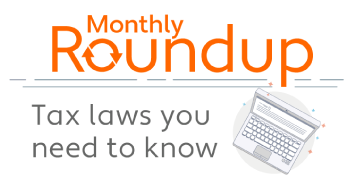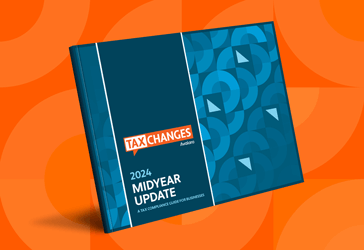June Roundup: Sales tax laws you need to know
June Roundup: Sales tax laws you need to know
While you focus on your business, we stay on top of legislative and policy changes that can affect your sales tax compliance.
Resisting the lure of the beach, lawmakers in many states spent June passing one bill after another. Quite a few impact sales and use tax.
Alabama Supreme Court says all software is subject to sales and use tax.
The state’s highest court determined that custom software is subject to sales tax in the Yellowhammer State just as canned software is. Learn more.
California limits the lookback period for some marketplace sellers.
Tax relief may be available for marketplace sellers that established physical presence nexus in California when a marketplace facilitator moved their inventory into the state. Learn more.
Connecticut changes small seller exception for remote sellers.
Fewer businesses now qualify for Connecticut’s small seller exception under the state’s economic nexus and click-through nexus laws. Learn more.
France makes marketplaces responsible for VAT collections.
France will be the first member of the European Union to require marketplaces to collect and remit tax on behalf of non-EU third-party sellers. Learn more.
Illinois makes marketplaces responsible for sales tax collection.
Marketplace facilitators must collect and remit the tax due on all marketplace sales starting January 1, 2020. Learn more.
Louisiana decides to enforce economic nexus … at some point.
There are few details, but it will be some time before July 1, 2020. Learn more.
Maine makes marketplaces responsible for sales tax collection.
Maine will require marketplace facilitators to collect and remit the tax due on all sales made through their platform as of October 1, 2019. Learn more.
Maryland makes marketplaces responsible for sales tax collection.
Like Louisiana and Maine, Maryland will soon require marketplace facilitators to collect and remit the tax due on all sales made through their platform. Learn more.
Minnesota changes small seller exception.
Currently, the economic nexus threshold in the North Star State is unique. As of October 1, 2019, it will mimic South Dakota’s and many other states. Learn more.
Nevada makes marketplaces responsible for sales tax collection.
Lousiana’s doing it. Maine’s doing it. Maryland’s doing it. Why not Nevada? Learn more.
New Hampshire stands it ground.
Lawmakers in the Live Free or Die State are determined to do what they can to make it hard for other states to impose a sales tax collection obligation on New Hampshire sellers. No, it won’t back down. Learn more.
New York changes economic nexus threshold.
Lawmakers in the Empire State upped the remote seller sales threshold from $300,000 to $500,000. There’s still a transaction component. Learn more.
Pennsylvania enforces economic nexus.
Remote sellers with more than $100,000 in Pennsylvania sales must collect and remit sales tax as of July 1, 2019. The Pennsylvania Department of Revenue encourages remote sellers to file and collect through a Certified Service Provider. Learn more.
Utah makes marketplaces responsible for sales tax collection.
Marketplaces facilitators must collect and remit the tax due on all marketplace sales starting October 1, 2019. Learn more.
When exemptions go local.
As of July 1, 2019, feminine hygiene products are exempt from the Denver city sales tax. Other local taxes and the state sales tax still apply. Learn more.
Sales tax automation is the most efficient and effective way to deal with the changes listed above. Learn more.
Stay up to date
Sign up for our free newsletter and stay up to date with the latest tax news.













